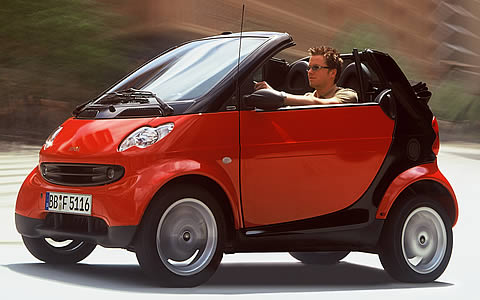
no armor and no hairshirt
The Washington Post reported three weeks ago (in an article syndicated in excerpts today in New York Newsday) that DaimlerChrysler has finally decided to let us dumb Yankees have a chance to buy the company's brilliant design concept for the twenty-first century, the Smart two-seater, called the fourtwo.
For the last few years they had been planning to introduce a much larger SUV version [huh?] of the tiny car which endeared itself to [smart] Europeans from the moment it hit the road in 1998. Now it looks like Americans' affection for the SUV has begun to cool, at least partly because we are rapidly closing the gap between the cost of gasoline here and in Europe, and 50 to 70 mpg is beginning to look very attractive. Several months back the company cancelled its ill-conceived steroid-Smart project.
DaimlerChrylser was about to make a big mistake, Warren Brown argues in his piece:
The United States is a part of the world. In terms of consumption of the world's resources, especially fossil fuels, it is one of the greediest parts. We often have a hard time here distinguishing between water and gasoline, which is why we waste both.But a Smart SUV had no originality and couldn't possibly have stirred the imagination as the original concept has. Also it couldn't have competed on a cost basis with the crowded existing market of down-sized imitators of up-sized armored-personnel-carrier wannabees, and the burden on pricing imposed by shipping costs and an increasingly-unfavorable exchange rate would have sealed its fate even before it could show whatever stuff it might have.At the moment, the United States is also the world's single largest automotive market, which means that it's the most lucrative. Big money seems to dance well with big cars and trucks, and we have developed an entire ritual, replete with mythological beliefs, to keep the rhythm going.
Big is better, ba-boom, ba-bang. Big is safer, ca-choom, ca-chang! Ain't nobody if you drivin' small; but you're ruling the world if you ridin' tall!
Given that nonsense, it was understandable that the people at DaimlerChrysler initially were suckered into the idea of bringing the first Smart to the United States as the Smart ForMore SUV. Americans understand SUVs, DaimlerChrysler reasoned. They don't understand micro-cars.
It matters not that the City Coupe and its other two-seat iterations have not earned a penny since their introduction in 1998. What matters is that they have stirred consumer imagination, and that they are selling, albeit not yet at a profit. With a few fixes -- a slightly larger wheelbase, better automatic and/or manual transmissions and a tad more cargo room -- they could become as much of a hit as the now-famed Mini Cooper, or even bigger.If that's not enough to attract our attention, it also comes as a convertible. Take that, Toyota! The Prius highbrid won't even offer a sunroof as an option, because Toyota says it would compromise its streamlined gasoline efficiency. But we shouldn't be required to wear hairshirts just because we want to be a little more green.That is what DaimlerChrysler now plans to do with the Smart two-seater in the U.S. market. It is going to make the car a bit larger but do nothing to destroy its urban funkiness. It will meet all existing U.S. safety and tailpipe emissions rules, of course; and, yes, adhering to those tougher standards will mean an increase in price.
But the Smart City Coupe and its mini-two-seater siblings now have something going for them that they did not have before -- an American reality check on spending at the gas pump. Growing world oil demand and consumption mean we can say goodbye to the days of dirt-cheap gasoline here.
[image originally from the Brazilian site, carsale]
The Week in Sustainable Vehicles (05/08/05)
http://www.worldchanging.com/archives/002666.html
"S&P downgraded the credit ratings of Ford and GM to junk bond status this week, spurred by concerns that the financial over-reliance of the two automakers on SUVs will make it difficult for them to overcome their financial woes and shrinking market share. (GCC.)"
"April sales figures for the automakers show that year-to-year sales of all full-size SUVs dropped 19% during the first four months of 2005, although overall sales of light-duty vehicles rose 1.2%. GM's full-size SUV sales dropped by 24% (79,790 vehicles), and Ford's by 21.5% (40,016). "
Imagine that world with gas at $4, SUV's dropped to a tenth of their value, and SMART cars making small sexy again.
Yummy.